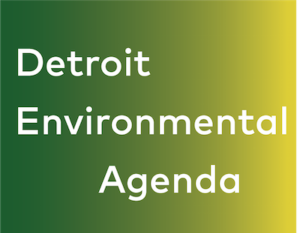EXECUTIVE SUMMARY
Why the Detroit Environmental Agenda? Why now?
Detroit is 88% people of color, with an alarmingly high rate of unemployment and a child poverty rate twice the state average.
(Image: Dot Density of Race/Ethnicity)
In 2011, over half of Michigan’s children with lead poisoning live in Detroit. The city’s asthma hospitalization rate is the highest in the tri-county area.
Quality of life for the majority of Detroiters is directly linked to the environment – the air we breath, the toxins in the soil, water, and buildings.
We need to do something about it – and we can.
(Image: Children less than six years of age with Confirmed elevated Blood Lead Levels 2011)
PATH TO HEALTHY CITY, HEALTHY PEOPLE
- Improve air quality to reduce health impacts
- Protect and restore our waterways
- Encourage resource-efficient homes, buildings, and neighborhoods
- Adopt a waste policy of Reduce, Reuse, Recycle
- Repurpose vacant land and buildings
- Ensure access to diverse housing options that are safe, healthy, and energy-efficient
- Ensure all residents, especially our most vulnerable, can safely and reliably get to desired destinations
- City and residents work together to create healthy, equitable, sustainable neighborhoods
Because it holds special authorities and duties by law, the City has a powerful role to play in ensuring a healthy environment where all, regardless of income, race, gender or creed, can thrive in social, economic, and environmental health.
- Use planning and zoning to ensure that land use, transportation, utilities, and waste management work together to create healthier, more vibrant communities
- Leverage economic development and jobs in cleaning up and restoring the city’s environment
- Engage residents and especially youth in creating beautiful, natural recreational areas that we can be proud of
- Keep the public informed and equipped to help maintain strong, healthy neighborhoods
WE WANT OUR CITY LEADERS TO:
Take a Holistic Approach to Creating Healthy, Sustainable, Equitable Communities: Update the Master Plan and Zoning for public health, and adopt water, waste, and energy policies that reduce pollution, increase efficiencies, and improve health.
Take Responsibility for Neighborhood Quality of Life: Uphold the highest standards for air, water, soil, neighborhood, and indoor environmental quality by enforcing law and regulations, and strengthening them where necessary.
Communitize Neighborhood Care: Support community mechanisms and tools for residents to develop neighborhood plans, care for land, help monitor and enforce laws, and address illegal dumping and code violations.
Make Forward-thinking Investments: Protect our natural assets, improve local and regional public transit, encourage complete neighborhoods, declare commitment to a clean economy, and prioritize social equity.
====>>>
CLEAN AIR
CLEAN WATER
CLEAN ENERGY
ACTIVE TRANSPORTATION
ZERO WASTE
HEALTHY LAND
HEALTHY HOMES
HEALTHY NEIGHBORHOODS
———————–
HEALTHY CITY
HEALTHY PEOPLE
CLEAN AIR
Detroit is home to at least 12 facilities that were out of compliance with federal regulations as of the end of 2012. A University of Michigan study found that Detroit is home to 5 of the top 25 most polluted zip codes in the state, including 48217 which has a toxic burden level 46 times the state average.
- Protect Public Health in Zoning Policies and Decisions
- Reduce Pollution from Current and New Facilities
- Reduce Pollution from Trucks and Diesel Equipment
- Create Mechanisms for Communities to Help Monitor Facilities and Trucks
CLEAN WATER
The Great Lakes account for 95% of the U.S. surface freshwater, and over 1/5 of the world’s freshwater supply. In 2011, Detroit’s sewer system discharged over 26 billion gallons of untreated or partially treated sewage into the Detroit and Rouge Rivers.
- Adopt a Comprehensive Water Master Plan using Detroit Water Agenda
- Optimize Available Land for Blue/Green Infrastructure
- Support Water Conservation and Stormwater Infiltration
- Reduce Industrial and Stormwater Water Pollution
CLEAN ENERGY
72 cents of of every dollar Michigan residents spend on energy flows out of the state for imported oil, gas, and coal. Detroiters spend twice as much of their household income on energy bills as the rest of the state. Weatherization alone could cut annual energy costs by over $400.
- Support Policies That Create a Clean Energy Future for Detroit
- Reduce Municipal Energy Usage and Costs
- Reduce Residential and Commercial Energy Usage and Costs
ZERO WASTE
Detroit recycles 7% of its total solid waste, compared to 26% on average for other major cities. The highest-ranking large city, San Francisco, recycles over 80% of its waste.
- Implement Recycling in Every District
- Encourage Secondary Markets for Recovered Materials
- Reduce Construction and Demolition Waste
- Reduce Illegal Dumping
- Reduce Commercial and Industrial Waste
HEALTHY LAND
Nearly 30% of Detroit’s population are within walking distance of a toxic release (1988-2009). Past industrial and commercial activity has also left legacy pollution, significant amounts of which remain today as brownfield sites.
- Clean Up Contaminated Land and Reduce Exposure to Health Hazards
- Communitize Care of Vacant Land and Properties
- Restore and Protect Natural Areas and Assests
HEALTHY HOUSING
In 2011, Detroit children had lead-poisoning rates twice as high as the statewide average. Lead poisoning lowers IQs, increases risk of ADHD, and increases aggression and delinquency. A Pittsburgh study found that juvenile delinquents were four times as likely to have been lead-poisoned as a child.
- Implement a Holistic Approach to Safe, Resource-efficient, Affordable Housing
- Increase Residential Energy Efficiency
- Improve Residential Indoor Air Quality
- Reduce Lead Paint Hazards in Homes
HEALTHY NEIGHBORHOODS
Heart disease, cancer, and diabetes are bigger causes of death in Detroit than they are statewide or nationally. Exposure to environmental pollution is a contributor to these types of disease, along with many other illnesses and health impacts such as low birth weights, infant mortality, respiratory disease, and obesity.
- Take Responsibility for Preserving Neighborhood Quality
- Encourage Community Leadership in Local Development
- Support Tools for Community Oversight
- Support Environmental Efforts that Improve Public Safety
ACTIVE TRANSPORTATION
According to Transit Riders United, DDOT riders working a six-day week would be late to work twice a week. Over 20% of Detroit Public School students (more than 14,000 students per day) rely on the public buses to get to school. 33% of Detroit’s low-income residents and 38% of our elderly residents don’t have access to a car.
- Make Equitable Transportation Decisions
- Improve Local and Regional Public Transit
- Make Non-motorized Transit a More Viable Choice
Many community-driven efforts and public-private partnerships are working to improve Detroit’s environment. Because this report is focused on policy opportunities for the City to play a strong role in environmental justice and sustainability, we have highlighted collaborative, environmental health, or environmental justice focused initiatives with citywide policy impact.
Community Action Against Asthma
Community Development Advocates of Detroit
The Consortium of Hispanic Agencies
Detroit Black Community Food Security Netowrk
Doing Development Differently in Detroit
Detroit Climate Action Collaborative
Detroit Digital Justice Coalition
Detroit Food & Fitness Collaborative
Detroit Food Justice Task Force
Detroit Food Policy Council
Detroit Future City
Detroit Greenways Coalition
Detroit Lead Partnership
Detroit Parks Coalition
Detroit Peoples Platform Convention
Detroit Urban Research Center
Detroit-Wayne County Green & Healthy Homes Initiative
Detroit Water Agenda
FoodLab Detroit
Friends of the Rouge Watershed
West Grand Boulevard Collaborative
Grand Resource Program
Lower Eastside Action Plan
Neighbors Building Brightmoor
NextEnergy Green Economy Initiative
North End Woodward Community Coalition
People’s Water Board Coalition
RecoveryPark
Southwest Detroit Community Benefits Coalition
Transportation for Michigan
Urban Agriculture Work Group
Woodward Corridor Initiative
Zero Waste Detroit
48217 Congress of Communities
WE COMMIT TO:
- Sharing the Detroit Environmental Agenda with mayoral and council candidates and asking them to respond to five questions
- Sharing those responses with you so that as informed citizens, you can help elect leaders who will take action for a cleaner, safer, healthier Detroit
WE ASK YOU TO COMMIT TO:
- Reading the Detroit Environmental Agenda and signing on as a supporter
- Sharing the Detroit Environmental Agenda with 5 friends
- Voting as an informed citizen
What’s next?
Detroit – cleaner, leaner, greener – is. And that means all of us.
See www.detroitenv.org to find out what’s happening and how you can elect and support strong leaders as we recommit to our city.

